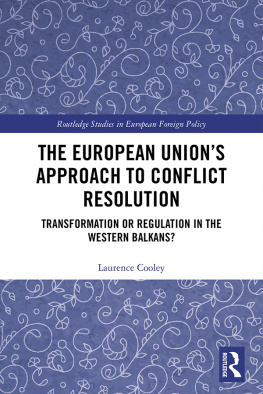New Perspectives on South-East Europe
Series Editors
Kevin Featherstone
London School of Economics and Political Science, London, UK
Spyros Economides
London School of Economics and Political Science, London, UK
Vassilis Monastiriotis
London School of Economics and Political Science, London, UK
South-East Europe presents a compelling agenda: a region that has challenged European identities, values and interests like no other at formative periods of modern history, and is now undergoing a set a complex transitions. It is a region made up of new and old European Union member states, as well as aspiring ones; early democratising states and new post-communist regimes; states undergoing liberalising economic reforms, partially inspired by external forces, whilst coping with their own embedded nationalisms; and states obliged to respond to new and recurring issues of security, identity, well-being, social integration, faith and secularisation. This series examines issues of inheritance and adaptation. The disciplinary reach incorporates politics and international relations, modern history, economics and political economy and sociology. It links the study of South East-Europe across a number of social sciences to European issues of democratisation and economic reform in the post-transition age. It addresses ideas as well as institutions; policies as well as processes. It will include studies of the domestic and foreign policies of single states, relations between states and peoples in the region, and between the region and beyond. The EU is an obvious reference point for current research on South-East Europe, but this series also highlights the importance of South-East Europe in its eastern context; the Caucuses; the Black Sea and the Middle East.
More information about this series at http://www.palgrave.com/gp/series/14733
Florian Bieber
Center for Southeast European Studies, University of Graz, Graz, Austria
ISSN 2662-5857 e-ISSN 2662-5865
New Perspectives on South-East Europe
ISBN 978-3-030-22148-5 e-ISBN 978-3-030-22149-2
https://doi.org/10.1007/978-3-030-22149-2
The Editor(s) (if applicable) and The Author(s), under exclusive licence to Springer Nature Switzerland AG 2020
This work is subject to copyright. All rights are solely and exclusively licensed by the Publisher, whether the whole or part of the material is concerned, specifically the rights of translation, reprinting, reuse of illustrations, recitation, broadcasting, reproduction on microfilms or in any other physical way, and transmission or information storage and retrieval, electronic adaptation, computer software, or by similar or dissimilar methodology now known or hereafter developed.
The use of general descriptive names, registered names, trademarks, service marks, etc. in this publication does not imply, even in the absence of a specific statement, that such names are exempt from the relevant protective laws and regulations and therefore free for general use.
The publisher, the authors and the editors are safe to assume that the advice and information in this book are believed to be true and accurate at the date of publication. Neither the publisher nor the authors or the editors give a warranty, express or implied, with respect to the material contained herein or for any errors or omissions that may have been made. The publisher remains neutral with regard to jurisdictional claims in published maps and institutional affiliations.
Cover illustration: Posnov / Getty Images
This Palgrave Pivot imprint is published by the registered company Springer Nature Switzerland AG.
The registered company address is: Gewerbestrasse 11, 6330 Cham, Switzerland
In loving memory of my mother, Karin Thimme-Bodzin (19412018).
Prologue: Advice for the Balkan Prince
Dear Balkan Prince,
Congratulations on your recent election.
I presume that you would like to retain power for as long as possible. While this is not as easy as it used to be, it is still possible, if you follow my ten rules outlined next.
You always have to remember that being considered a democrat and a reformer is a judgment that matters more if it comes from outside, from the EU , international observers, and organizations. They might be stricter than your domestic audience, but they are also more ignorant and likely to lose interest quickly.
1. Control the elections, not on election day, but before
While some of your predecessors might have been able to just stuff ballot boxes or raise the dead to vote for you, or even better, make sure you have no opponents running in elections , this is no longer possible. You need to win elections and be also recognized by outsiders. These outsiders might be less picky in the Caucasus or Africa, but you have to look like a good democrat in the Balkans. My dear prince, this does not mean you have to be one. There are still a few ways to do well.
First, see elections as a way to get stronger. Time elections well: many and early elections can help catch the opposition off guard and also to have votes when your popularity is at its peak. Offer voters a bit of money, or forgive them their outstanding electricity bills, there are many ways in which you can get votes for just little money. Sometimes consider offering a bit of money for people not to vote (you know that they would just cast their ballots for your opponents). It also helps to taint the opposition as being suspicious, sexually deviant, disloyal to the state , and generally dubious.
2. Control the media, make sure you have many voices, which all say the same and have your junk-yard dog
The media is what matters to retain power domestically.
Now, you dont own them anymore, like other princes before you did. However, few of the media are economically viable, and the best way to control them is to advertise only in the ones that report well on you (and dont forget, you are the largest advertiser). Many newspapers and TV stations are probably owned either by some Western media company that value profit margins over standards or a shady local businessman about whom you can certainly dig up some unpaid tax bills.
Journalists can sometimes be a bit pesky, and the best way to make sure that they are behaving well, is to threaten them a little bit, not in public, but pressure a few. Most will be happy to censor themselves.
3. Talk about the EU and wanting to join it, but make it hot and cold
You might not really care or understand the EU and this is fine, but wanting to join the EU is a must. Without this, you probably would not have got elected considering that all voters want EU membership. Furthermore, you could be left out in the dark if you dont support the EU , as forming a government requires a stamp of approval from the EU . Thus, want the EU , but throw in a dose of ambiguity. Being too pro-European these days seems like trying too hard with a partner who doesnt really want you. Thus, throw some doubt on the project.
4. Talk about fighting corruption and reforms. Talk and talk and jail a few
















